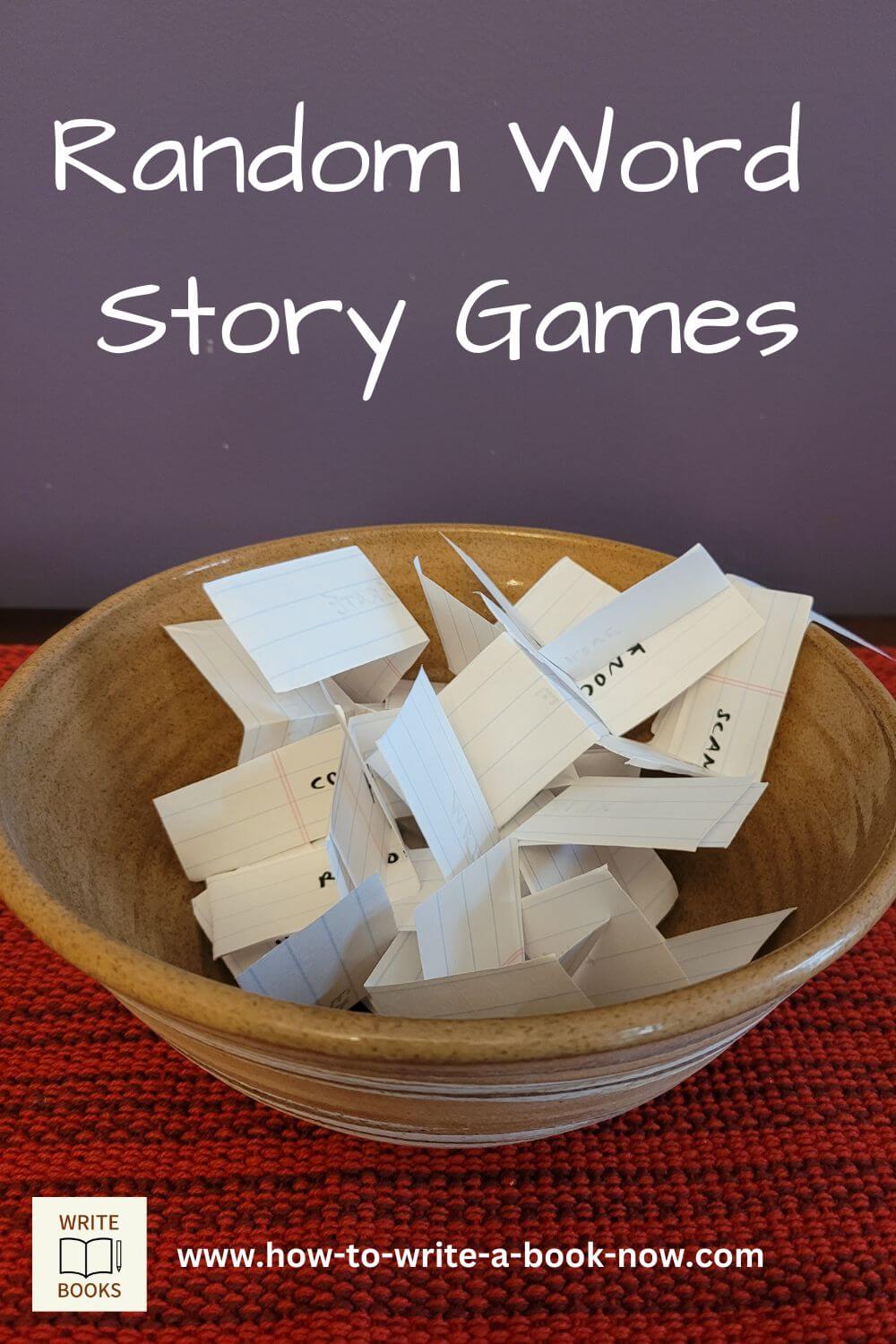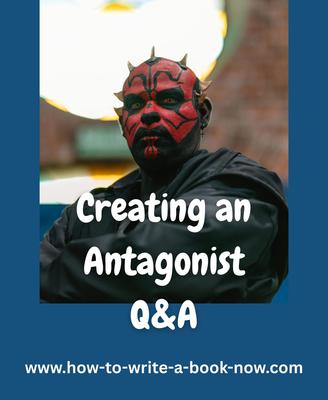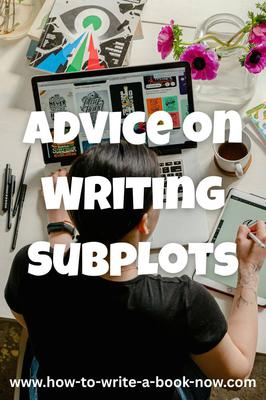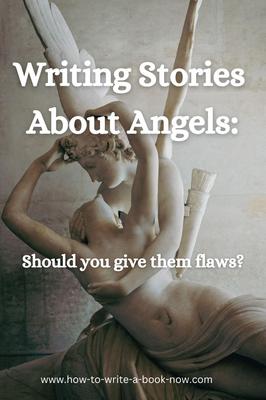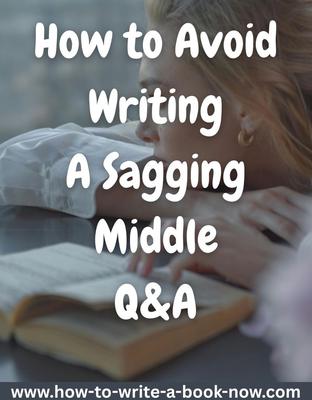Random Word Story Games
By Glen C. Strathy
Random word story games are a great way to generate original story ideas, writing prompts, or even entire stories. There are many different games you can play with random words. I'll cover some of my favourite ones below. All of them combine the three elements of good story games...
1. Random elements (in this case words chosen at random).
2. Making meaning from random elements.
3. Low stakes.
Use any of the games below whenever you are stuck for a story idea, or you just want to do some fun writing to get yourself out of a rut or a bout of writer's block.
Just before we start...
Random Word Generators
You can get random words from a number of different sources.
Back in the day, writers would open a random book at a random page, close their eyes, and drop a pencil point onto the page. Whatever word the pencil landed on would be next random word in whatever game they were playing. You can use any book for this, including a dictionary or thesaurus, but usually a novel works best.
A simpler method is to take the first or last word on whatever page you randomly open to. This works best if you exclude words with fewer than four letters, like "a" or "of."
So many writers and writing teachers use random word story games that you can now find find many random word generators online, which makes it very easy to play these games by yourself or with others. Here is just one I find useful that lets you specify the length of the words it generates and whether you want nouns, verbs, or adjectives...
You can also use a bowl of magnetic poetry words you can draw from at random. Or, if you have the time, you can write words you really like (nouns, verbs, adjectives, or adverbs) on slips of paper and keep them in a bowl, adding to them whenever you come across new words that strike your interest. You will want a few hundred words in your bowl so you don't draw the same words too often.
Common words are usually easier to work with if you're writing fiction. If you write poetry, uncommon or technical words can often stimulate more interesting ideas.
"Pick Three Nouns:" A Random Word Story Game
Let's start with an easy random word story game I call "Pick Three Nouns."
Step #1
Using whatever random word generation method you like, get three random nouns.
I did this just now and got... "success," "garlic," and "knife"
Step #2
Write a sentence containing all three nouns. If you want to change the form of a word, you can. For instance, if you get a noun like "drawing" you can change it into the verb "draw" or change the tense to become "drawn." You could even change it into a noun like "chest of drawers." The point is to be creative and have fun, not to be too rigid with the rules.
So with my three words I might write a sentence like...
"Martha's knife flew up and down, evenly mincing the garlic cloves, knowing that her acceptance into culinary school depended on this next dish being a success."
Or:
"Having spent ten years making the family's garlic farm successful, Tom felt his brother's words like a knife in the back."
Repeat the first two steps a number of times, creating a variety of sentences. (Try for at least ten.)
Step #3
Decide which three sentences interest you the most out of the ones you created.
Step #4
Take one of your chosen sentences and write it at the start of a blank page or new document.
Step #5
Assume the sentence is the first sentence of a story. Continue writing the story from that point. Spend at least ten minutes on this, so the story has a chance to develop a little.
Repeat Steps #4 and #5 with your other favourite sentences.
Step #6
You now have the beginnings of several stories. Finish the ones you like the most.
Random Word Disruptions
The Surrealists used to play a random word story game called Parallel Stories.
The original version was meant to be played by a group of writers. Everyone would sit in a room writing their individual stories at the same time. At fixed intervals, the writer whose turn it was would call out the word they were currently writing in their story. Every time a word was called out, the other writers would have to work that word immediately into the story they were writing.
Here's a variation on this game you can play on your own. I call it, "Random Word Disruptions"...
Step #1: Set a timer for anywhere from thirty seconds to five minutes (depending on how fast you write and how much of a challenge you want).
Step #2: Using the random word generator of your choice, generate one random word. Write the first sentence of a story. This sentence must contain the random word.
Step #2: Start the timer and continue the story.
Step #3: When the timer goes off, use the random word generator to produce another random word.
Step #4. Start the timer again.
Step #5: Incorporate the new random word into the next sentence you write. (As usual, feel free to use a different form of the word.)
Step #6: Continue this exercise for as long as you like or until you have a complete story.
A Simpler Variation
You can also play Random Word Disruptions by leaving out the timer and simply drawing a random word after each sentence or paragraph you write. You must then use the random word in the next sentence or paragraph.
The Opposite Game
Another random word story game invented by the Surrealists is The Opposite Game, which is a good way to generate writing prompts. Here's how it works...
Step #1: Take a bit of prose someone else wrote. It could be a poem or a passage from a book you like. For instance, I'll take the first sentence of the next book on my TBR list, The Secret History by Donna Tartt:
"The snow in the mountains was melting and Bunny had been dead for several weeks before we came to understand the gravity of our situation."
Step #1: Replace each word (or at least each important word) in your chosen passage with a word that means the opposite. In my example, I might get...
"The rain on the canyon floor froze and Tiger revived one day later, after I misunderstood the magnetic nature of his activity."
Note that one word can have many opposites. You can have a lot of fun deciding what the opposite of each word should be. In this case, I decided "magnetism" was a fair opposite of "gravity," though I could have used "joviality" instead. Similarly, while I decided that "activity" was a fair opposite of "situation," you might have made a different choice
Step #3: Use the new sentence (or sentences, depending on the length of passage you chose) as the first sentence of a story. Continue the story from that point.
The Opposite Disruptions Game
You can also combine The Opposite Game with Random Word Disruptions. This has a certain advantage.
With most random word story games, the random words have no connection to each other, other than they happen to have been selected using the same method.
But often you want the vocabulary of a
story to create a consistent atmosphere or emotional tone. You want your
list of words to be random, and yet also have a connection with each
other. Combining The Opposite Game with the Random Word method can give you a random set of words that are randomly chosen yet still feel related. Here's how it works...
Step #1: Pick any story or novel you like.
Step #2: Take the first paragraph or the first few sentences of the story and copy all the significant words (no articles, prepositions, etc.) into a word processor document. Also leave out any proper names that would identify the story.
For example, I'll take the few first sentences from Harry Potter and the Order of the Phoenix by J.K. Rowling. The words that seem significant to me are:
hottest
day
summer
far
drawing
close
drowsy
silence
lay
large
square
houses
cars
usually
gleaming
green
lay
parched
yellowing
use
hosepipes
banned
drought
Someone else might have made a slightly different list, depending on which words stood out for them. That's fine.
Step #3: Replace each of these words with a word that means the opposite. This gives me a completely new list of words...
coldest
night
winter
close
pushing
distant
alert
cacophony
rose
small
round
fields
horses
seldom
dirty
orange
professional
moist
revitalizing
help
rivulets
allowed
flood
Again, you can be creative in choosing opposites. For instance, I wrote "pushing" as the opposite of "drawing," but I might have written "painting" instead. I could have written "stood" as the opposite of "lay," but I chose "professional."
What is the opposite of a word like, "yellowing"? That's a question you can have fun answering in your own way.
Once you have replaced each word with a word that means the opposite to you, you will have a collection of words that do not appear in the original work. Yet they have a subtle relationship with each other because they were inspired by a common source and because you chose them. For instance, like the original, they are words you could use to describe a setting more so than action or emotion.
Step #4: Write each of these words on a slip of paper and put the slips into a hat or bowl.
Step #5: Now play the Random Word Disruptions game above, but to get each random word, pick a random slip of paper from the bowl.
Once you run out of slips of paper, you may continue the story however you like.
- Home
- Writing Games
- Random Word Games
